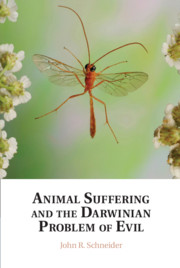Book contents
- Animal Suffering and the Darwinian Problem of Evil
- Animal Suffering and the Darwinian Problem of Evil
- Copyright page
- Dedication
- Contents
- Foreword
- Acknowledgments
- Introduction
- 1 Facing the Darwinian Problem of Evil
- 2 Darwinian Evil and Anti-Theistic Arguments
- 3 Ways around the Problem
- 4 Making a “Case for God” (a Causa Dei)
- 5 Animal Suffering and the Fall
- 6 Narrow Is the Way of World Making
- 7 God-Justifying Beauty
- 8 Suffering “For No Reason”
- 9 Darwinian Kenōsis and “Divine Selection”
- 10 Animals in Heaven
- Bibliography
- Index
5 - Animal Suffering and the Fall
Lapsarian Theodicy
Published online by Cambridge University Press: 17 March 2020
- Animal Suffering and the Darwinian Problem of Evil
- Animal Suffering and the Darwinian Problem of Evil
- Copyright page
- Dedication
- Contents
- Foreword
- Acknowledgments
- Introduction
- 1 Facing the Darwinian Problem of Evil
- 2 Darwinian Evil and Anti-Theistic Arguments
- 3 Ways around the Problem
- 4 Making a “Case for God” (a Causa Dei)
- 5 Animal Suffering and the Fall
- 6 Narrow Is the Way of World Making
- 7 God-Justifying Beauty
- 8 Suffering “For No Reason”
- 9 Darwinian Kenōsis and “Divine Selection”
- 10 Animals in Heaven
- Bibliography
- Index
Summary
In this chapter, the author considers Lapsarian Theodicy, according to which the originating cause of natural evil, including the suffering of animals in nature, was a cosmic Fall set in motion when the first human disobeyed God. He argues that, besides being antiquated by Darwinian science, this traditional explanation of animal suffering fails on four analytical-theologicalgrounds. For it entails (1) an implausible original fragility of the created world, (2) extreme moral impropriety on God’s part, (3) an implausible account of motivation to do evil in paradisiacal circumstances,and (4) an overvaluing of human freedom. Furthermore, the author argues that Lapsarian Theodicy is not supported unambiguously by the story of Adam and Eve in Eden, as commonly assumed. He concludes that theists are best advised to search for non-lapsarian alternatives, as the majority of participants in the controversy are doing.
- Type
- Chapter
- Information
- Animal Suffering and the Darwinian Problem of Evil , pp. 80 - 108Publisher: Cambridge University PressPrint publication year: 2020

